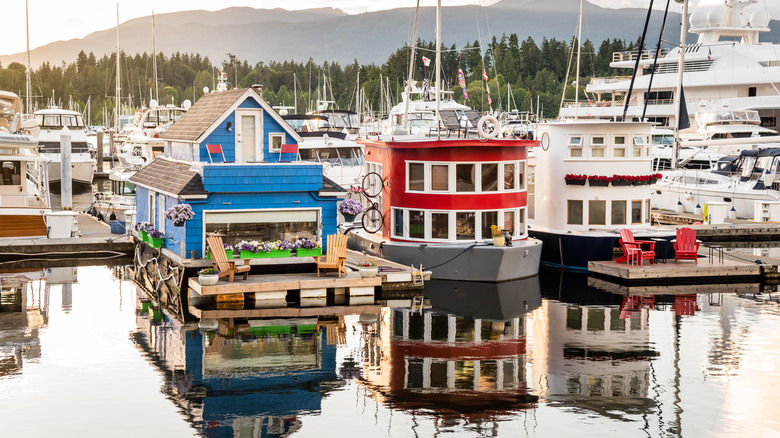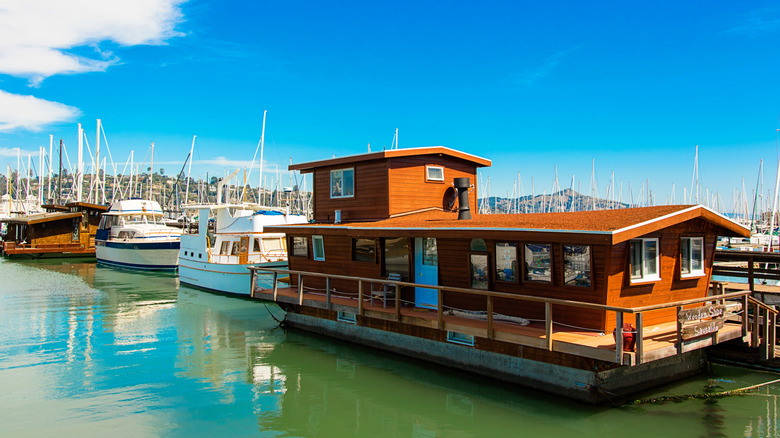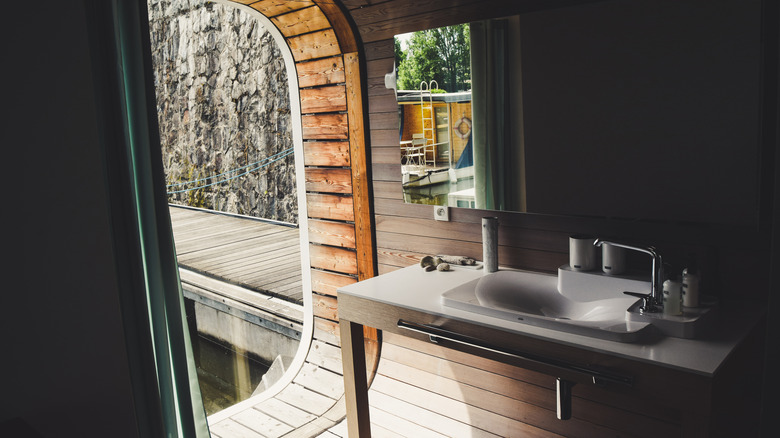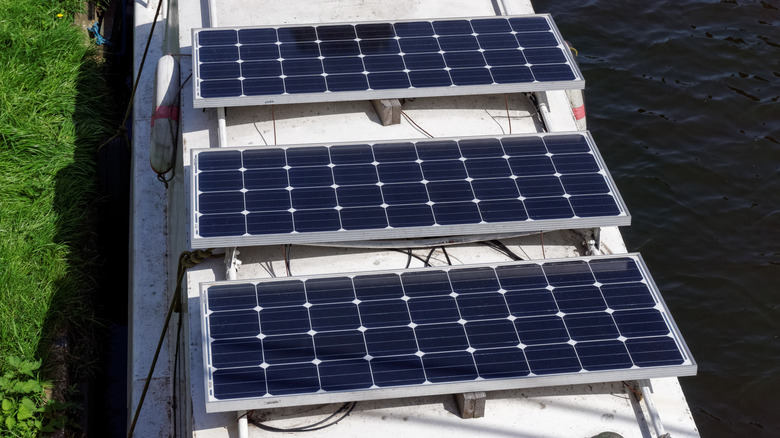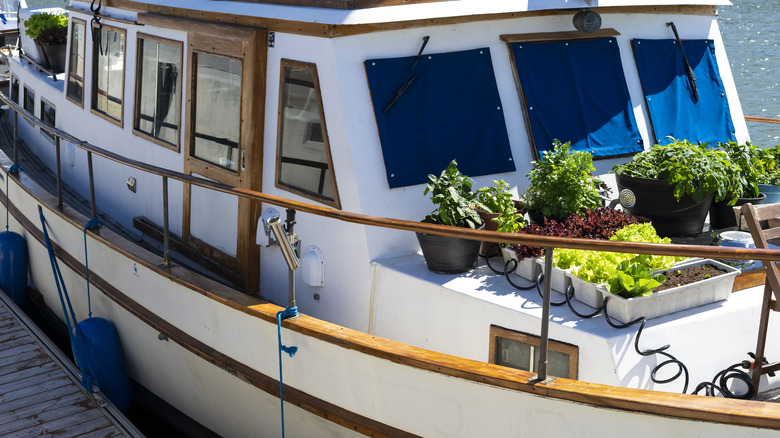What You Should Know Before Living In A Houseboat
Houseboats offer a flexible lifestyle for those who love smaller living and waking up to a fresh water breeze and birds singing every morning. Living on the water can be quite soothing, and the traveling possibilities it provides are alluring to many. Houseboats differ from sailboats and yachts in that they are meant to be much more stationary and feature a maximized indoor structure that other boats won't. They can cost anywhere from $100,000 to over $1 million — dependent upon the size, condition, and location. While that is a hefty investment, houseboats can last up to 50 years or longer if cared for properly.
Although houseboats can't be bought with conventional mortgages, you can often find them listed on real estate websites and work with an agent to purchase one. Some banks will offer home loans meant explicitly for houseboats, and others will recommend a personal property loan. Regardless of how you plan to buy your home on the water, there are a few vital components to keep in mind as you consider living in a houseboat.
Property taxes and insurance
When looking into buying a houseboat, you will quickly find that they don't require property taxes, as the marinas you'll be utilizing are paying for the land. However, there are fees that marinas will charge, usually depending on a boat's size, that helps with the costs of taxes and services provided. In addition, similar to cars, houseboats will require an annual registration tax and insurance costs. While it typically isn't a requirement from the state to have insurance on a houseboat, most marinas and loan lenders will request it.
Marinas offer many valuable resources for houseboat residents, but if you want to avoid these charges, anchoring away from a dock can save money. Another cost-effective feature is the ability to claim a houseboat as a residence on federal taxes. This gives the same tax deductions that traditional homeowners receive, and houseboats can be filed as a second home if you also have a home on land.
Plumbing
One of the first things we all ask ourselves when considering houseboat living is how exactly do we use the bathroom. Plumbing in these floating houses isn't too different than what you will find in other portable homes like RVs. Houseboats will feature a pressurized water system with two tanks — one for fresh water and one for waste. Freshwater tanks can be refilled at marinas, and waste can also be disposed of at marinas or waste pumps. The freshwater tank will work with an electrical or manual pump to supply water to appliances like a sink and shower. Hot water is available on houseboats through small water heaters that can be installed in the kitchen.
Toilets will work differently in that they will source water from outside the boat and have a separate water pump and filter, and waste from your toilet will still go to the same waste tank as other appliances. If you ever find yourself without electricity, however, you will be unable to use either your toilet or faucets, as the pumps will not function.
Electricity
Getting electricity on houseboats is relatively simple and what one would expect. The main engine or generators are a primary power source, but other methods of renewable energy like solar panels and wind turbines can be used. The energy created is stored in battery banks inside the boat. The battery banks a houseboat holds will typically store enough power to be able to run washers and dryers, as well as small air conditioning and heating units. Marinas will also offer power on shore with the use of a marine extension cord. It is important to note, though, that shore power is typically metered and can cost anywhere between $50 to $100.
For wifi, there are many routes someone can take. Getting wifi enabled offshore requires an external antenna linked to an inside router with an ethernet cable boosting the signal. Connecting devices to a phone hotspot is a common choice, and again, marinas will usually have wifi available.
Pets
Pets create irreplaceable warmth and comfort in our homes, and you can undoubtedly take your furry friends with you when moving into a houseboat. Naturally, all pet care will get a bit more complicated, but with the proper knowledge and resources, it'll be second nature in no time. All pets, even smaller ones like cats and rabbits, should wear a pet floatation device whenever they are on the water. Most dogs are great swimmers, but unexpected waves and currents can easily deter a well-practiced pet.
It is also a great idea to have all pets chipped due to the frequent travel and variety of locations visited. This will make it easy for anyone to get ahold of you if they find your lost pet, regardless of location. Another thing to consider investing in is non-slip food and water bowls, so there aren't continuous spills every time the boat hits a bump.
Dogs are one of the only pets that require going outdoors for potty breaks, and obviously, you won't always be near the shore. Similarly to a litter box, create a designated area for a dog to use. Many people opt for grass mats for easy cleaning and keeping the pet in an outdoor mindset. Lastly, always be sure to check marina rules for any restricted breeds or fees that come along with bringing your animals to shore.
Repairs and maintenance
Houseboats will require routine maintenance, more than you might find with a car or traditional house. Keeping up on regular care will make all the difference in the longevity of your houseboat's life and is crucial for your safety. Oil changes, belt changes, engine upkeep, and exterior preservation are needed. It would be best to avoid oil and fuel spills by never filling the tank more than 95% full and consistently checking fuel lines, hoses, hydraulic lines, valves, oil seals, and gaskets.
Needed repairs will commonly arise as weather damage, electrical malfunctions, and plumbing issues. Water leaks and hull damage are essential to be aware of. Luckily, many insurance policies cover various matters to help decrease expenses. Different plans offer coverage on theft, storm damage, sinking, fires, collisions, and vandalism. You can also add protection for your personal belongings, any injuries acquired, and living cost reimbursements if you are displaced while your houseboat is being repaired.
